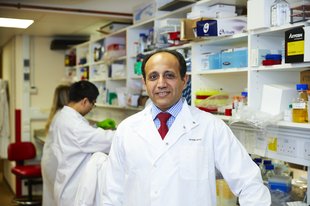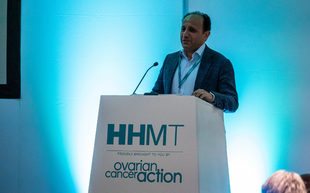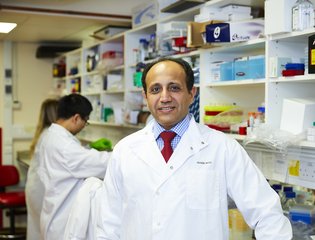Ovarian cancer vaccine moves closer to reality

Professor Ahmed Ahmed's groundbreaking research, funded by Ovarian Cancer Action, has received a major boost from Cancer Research UK to develop the world’s first vaccine to prevent ovarian cancer.
Exciting news in preventing ovarian cancer! A pioneering team, led by Professor Ahmed Ahmed, at the University of Oxford is working to create a first-of-its-kind vaccine, called OvarianVax, that could prevent ovarian cancer.
The groundbreaking research behind this project was initially funded by Ovarian Cancer Action and has now secured funding from Cancer Research UK (CRUK) to help make it a reality.
The vaccine is being designed to train the immune system to recognise and destroy ovarian cancer cells at their earliest stages — before they even have a chance to spread. Over the next three years, the Oxford team will receive up to £600,000 in CRUK funding to carry out its lab studies.
How does the vaccine work?
The team’s first step is to figure out which proteins linked to early ovarian cancer cells can be best identified and attacked by the immune system. They’ll see how well the vaccine works on tiny models of ovarian cancer, called organoids. If successful, this could lead to clinical trials with women at high risk (BRCA gene fault) and one day offer all women a powerful tool to prevent the disease.
Speaking about why a preventative vaccine is important, Professor Ahmed said:
"We need better strategies to prevent ovarian cancer.
Currently women with BRCA1/2 mutations, who are at very high risk, are offered surgery which prevents cancer but robs them of the chance to have children afterwards.
At the same time, many other cases of ovarian cancer aren’t picked up until they are in a much later stage.
Teaching the immune system to recognise the very early signs of cancer is a tough challenge. But we now have highly sophisticated tools which give us real insights into how the immune system recognises ovarian cancer.
OvarianVax could offer the solution to prevent cancer, firstly in women at high risk but also more widely if trials prove successful."
Ovarian Cancer Action’s role in the research
As the UK’s leading ovarian cancer research charity, Ovarian Cancer Action is incredibly proud to support this research. Ovarian Cancer Action has funded Professor Ahmed Ahmed’s previous research over the past decade that this project will now build on, and will continue to partner on this current research project.
What makes this vaccine project even more special is that it’s not just about science. Ovarian Cancer Action organised a workshop where women with lived experience of ovarian cancer shared their views. The result? The patients agreed that a vaccine would be strongly welcomed by women most at risk of developing the disease and were able to recommend the type of vaccination they felt would have the greatest uptake.
Speaking about Ovarian Cancer Action, Professor Ahmed said:
"I can’t thank OCA enough for their support over the last decade to enable the ground work that led to us being in a position to now start developing this vaccine.
Thanks to this funding, our research can take a big step forward towards a viable vaccine for ovarian cancer."

Professor Ahmed was awarded funding for his revolutionary concept at the 2019 HHMT International Forum.
A game-changer for women at high risk
Every year, over 1,000 women are diagnosed with ovarian cancer that might have been preventable. Some women carry a BRCA gene fault, sometimes called a mutation or alteration, which puts them at higher risk. Right now, the main option for these women is surgery, which often comes with life-changing consequences.
Marie-Claire Platt, Head of Research at Ovarian Cancer Action, explains:
"Over 1,000 women every year are diagnosed with ovarian cancer which should have been prevented. Since the discovery of the faulty BRCA gene we’ve known that some women have a much higher risk of developing ovarian cancer. This research could finally offer these women the chance to reduce their risk without life-changing surgery.
Over the last decade, Ovarian Cancer Action has been funding research led by Professor Ahmed to understand where and how ovarian cancer starts. This project will translate those discoveries into a vaccine that could save thousands of lives.”
Collaboration as a key to success
Ovarian Cancer Action will continue to be a partner in this research project. With its decades-long expertise working with this patient community, it will provide funding for the continued involvement of patients in the research. This will be crucial to the success of the project.
For more information or media inquiries, reach out to our press office at pressoffice@ovarian.org.uk.


